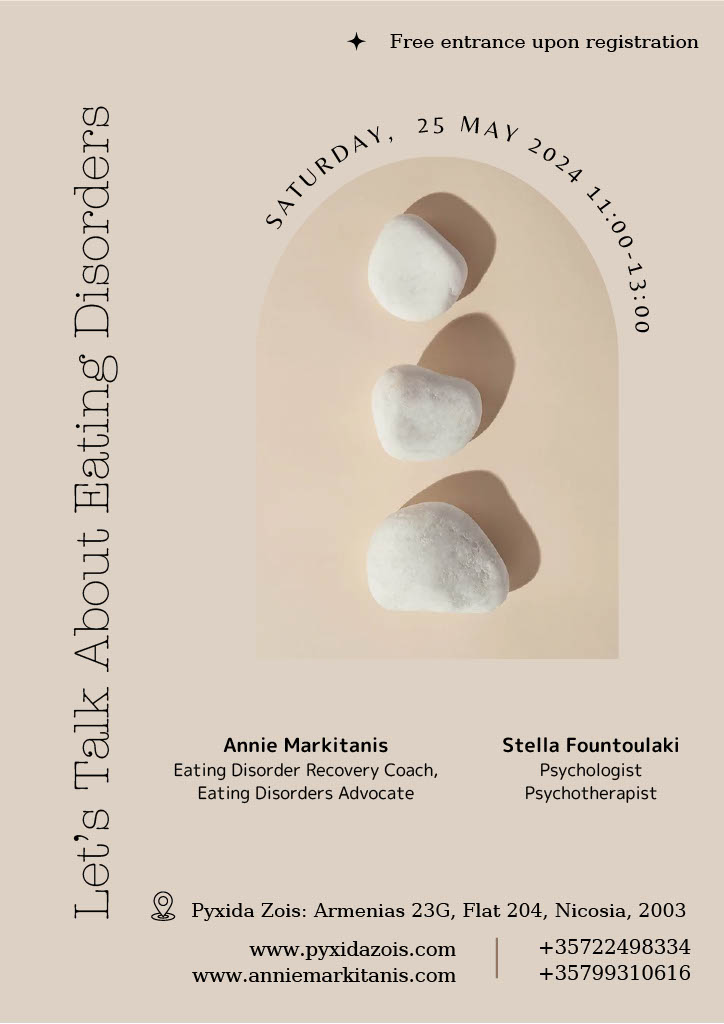With an Eating Disorder even if you know Why you got sick, and even if you want to get better, you don’t know How…
Within the frame of an intimate talk, participants will be engaged in an informative and interactive presentation and discussion useful for clinicians, sufferers and carers alike. Annie Markitanis, an Eating Disorder Recovery Coach, Eating Disorders Advocate and an openly recovered professional, together with Psychologist and Psychotherapist Stella Fountoulakis rely on their innovative and successful synergy of working together with some challenging Eating Disorder cases, to revisit the How vs. Why narratives involved in the development of and most importantly in the recovery from an Eating Disorder. The definition, and implications for one reaching full recovery will also be discussed.
Stella Fountoulakis, will focus on the “Why” facet of Eating Disorders. From the point of view of psychological research and clinical practice, Fountoulaki will explore the risk factors — characteristics, conditions, behaviors, or variables that increase the likelihood of an individual developing an eating disorder — delving more specifically into the psychological, biological and sociocultural factors that play an important role, not only in the appearance of eating disorders but also in their progression and sustenance. Furthermore, will discuss the coexistence of mental difficulties which often surface with eating disorders and how such difficulties and challenges contribute to and/or complicate the disorder itself and overall the recovery process.
Annie Markitanis, will focus on the “How” aspect of recovery proposing different effective strategies for lasting behavior change in Eating Disorders. Markitanis will discuss how we keep a sufferer in line, guiding him/her towards full recovery. Relying on the role of the Eating Disorder Recovery Coach — a game changer in the treatment of Eating Disorders, filling a much-needed gap in traditional services by working in conjunction with one’s treatment team, operating outside office hours and helping “in the moment” during real-time day-to-day struggles — she will delve into the recovery’s double sided path: What does one recover from and what does one recover towards?
Having lived for almost two decades with a brain that was once hijacked by an eating disorder, before reaching full recovery, Markitanis raises and explores such questions as: What types of “in the moment” support ED sufferers require and How do we provide them? How do we help one to stay on track when their motivation, patience and hope gets shaky? How can we help one cope with that internal battle between one’s healthy self and unhealthy/ed self? How do we deal with resistance and body dissatisfaction? How can we urge lasting behavior modification? How can we help one learn to feel their feelings but challenge their thoughts? How can we assist one reestablish his/her relationship to food and body and what would such revamped relationship look like? How do we reconnect sufferers to their true nature? How do we inspire sufferers to want to recover and stay recovered?
Acting as a reminder of hope, a special focus will be attributed to the notion and meaning of full recovery, emphasizing that everyone can fully recover irrespective of their past attempts or the duration that one has been suffering, if they only choose to.
* The talk will take place in Greek (by Stella Fountoulakis) and in English (by Annie Markitanis)
* When: Saturday, 25 May 2024 | 11:00-13:00
* Where: Pyxida Zois, Armeras 23G, Flat 204, Nicosia, 2003
* Free Entrance upon registration | Limited Seats Available
* To register: Please call at +357 22498334 | +357 99310616 Or via email at: stella@pyxidazois.com | ammarkitanis@gmail.com
